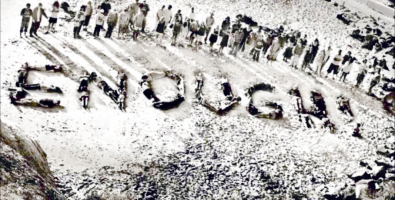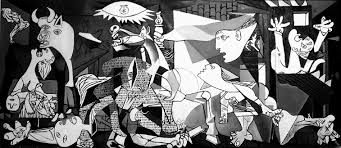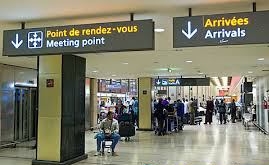This is the third in the series of reviews I will post over the next two months of the 5 collections chosen for the 2017 Forward Prizes Felix Dennis award for best First Collection. The £5000 prize will be decided on 21st September 2017. Click on these links to access all 5 of my reviews of the 2016 shortlisted books (eventual winner Tiphanie Yanique) and all 5 of my reviews of the 2015 shortlisted books (eventual winner Mona Arshi).
The 2017 shortlist is:
Maria Apichella – Psalmody (Eyewear Publishing) – reviewed here
Richard Georges – Make Us All Islands (Shearsman Books) – reviewed here
Eric Langley – Raking Light (Carcanet)
Nick Makoha – Kingdom of Gravity (Peepal Tree Press)
Ocean Vuong – Night Sky with Exit Wounds (Cape Poetry)

Many thanks to Peepal Tree Press for providing a copy of Nick Makoha’s book for review purposes.
Poetry is an art of the relative, but the ability to write about contemporary events beyond one’s personal sphere always strikes me as an absolute and rare talent. Yet it always turns out the poet’s individual circumstances contribute to such escapes from the personal and this is so with Nick Makoha who has talked of writing in exile from Uganda. He fled civil war and the rule of Idi Amin as a five-year old boy in 1979. Many of the poems in Kingdom of Gravity are shocking (and so powerful in particular ways as art) and their obsessive subject is power without justice in post-colonial Africa.
There are moments when early Auden seems a useful comparison. Each poem creates its own world of suspicion and unease, often of violence. Each poem is spoken by a human subject – I thought of Glyn Maxwell’s phrase “the presence of a human creature” (On Poetry, Oberon Books, 2012). This is maintained even though the materials of the poems are journalistic, clogged with stuff, hawked up, hacked off incidents that most of us are only familiar with from news, TV and film. The forms are often shaped but roughly so; Makoha’s voices often make use of anaphora/repetition and tend to the epigrammatic. Such patterning is mostly ironic because if there is one thing this collection expresses it is a sense of exile and disconnect, a loss of all moral compass. The construction of the book seems to encourage this sense of disconnect. Three poems evoking Uganda’s 1979 turning point (after Amin’s 8 year rule) are scattered across 2 of the 5 sections of the book. Each of the 5 sections are introduced by poems linked with airports and travel, distance, arrivals, departures – exile again – and these set the tone.

The figure of Amin – and those in the ensuing years who have resembled him – recurs. The book is full of father figures, often distorted, corrupt, vicious, God-like, their hands covered in blood. A crocodile is considered in one poem, the creature imagined as Idi Amin’s teacher:
Wrath the only nature of God you taught him.
What of mercy, peace and Uganda?
Our bodies still rest in your jaws.
The book’s opening lyric, ‘Highlife’, praises the power that comes with “Presidency” and these include the power to throttle another man, to spare a life, to change perception by force, to be acknowledged as “God”. Such big men always promise much to gain adherents but in promoting themselves they soon threaten far more than they deliver:
This man is a firm knot in our chest. A landlord draped
in Savile Row suits, who uses our towns as a race track.
Mark the length of his shadow; where it reaches,
men fall.
(‘Big Nation’)

The book’s title poem is like this. Re-writing Shelley’s ‘Ozymandias’ and Auden’s 1939 ‘Epitaph on a Tyrant’ from the inside, Makoha speaks as a man wanting to create a world wholly in his own image: “What makes a man name a city after himself, / asking bricks to be bones”. His conviction is that he has been spoken to by “an oracle”; he claims to be searching for “a place to call home” but ominously is equally “in search of fire”. The kingdom of gravity is the condition of “having the world at your feet” and Makoha’s analysis of tyranny looks deceptively open-ended, asking if once the world is believed to be fully known, a reflection of the power-hungry self, then “how will you be sure that nothing is lost?” Such absolute control is an impossibility, of course, and for the tyrant the only solution is a call to arms: “Smear your bodies in red oil. Tonight we split the darkness. / We will be remembered as the wild cats // who smeared their bodies in blood” (‘From the King’).
As this makes clear, tyrants need followers. They are well represented in the book – both as victims and as the breeding ground for the next wave of tyranny. ‘Watchmen’ seems voiced by a man in whose calculations his wife, children, contraband, money, beer and a prostitute all seem interchangeable counters in his mind’s equations. Hard to follow what happens next – the border between fact and fantasy is uncertain – but a powerful male figure rips a sheep to pieces, offers it to other men if they become his “true bloods”. There are plenty of takers:
Some say he had promised land, others positions,
and yet others gold. The truth is we all wanted
to be kings with wives and cars.
There is a drone in our voices.
The night’s coolness has not yet gone.
The apparition snatches a Kalashnikov from a shepherd’s fist
and slips into the river. What’s weird is we all break rank
and like a swarm follow singing his incantations
and like a swarm follow singing his incantations.

The willing yielding up of individuality implied in the choice of the word “drone” is driven home in the final lines which repeat Frost’s repeating trick in ‘Stopping by Woods on a Snowy Evening’ but turn his swooning/determined ambiguity into an unambiguous, threatening, weaponised, overwhelming “swarm” of humanity.
The speaker’s sense that something “weird” is happening, the potentially redemptive sense of the growth of evil is reflected in a few other poems such as ‘The Liberation’ where someone who “used to be a boy” now moves “like smoke across the red dirt towards the second terminal”. In this case, such drastic shifts in human behaviour are considered “a costume” to be worn when the earth “erupts” but the potential reversal of the process implied by this metaphor elsewhere looks like liberal wishful thinking. ‘Candidate A’ seems voiced by a tyrant selection committee, enumerating an individual’s qualities, making him suitable for elevation to “His Excellency, Field Marshall, / Effendi etcetera”. Love of his own reflection, unprovoked violence, rejection of the rules, an appetite for acclaim and acquisitiveness replaced by “immediate gratification” mark out this fanatic among the ranks for a bright future though ultimately he’s to be used by whomever is speaking: “in his effort to be remembered, we will make our mark”.

I was reading this book partly while visiting Guernica in the Basque region of Spain. In the commemorative museum, I was struck by a quotation from Gandhi: there is no way to peace; peace is the way. As in Picasso’s painting of the bombing of the town in 1937, Makoha’s poems give us more of the horror of when things break down, but also remind us that peace is more than just the absence of war. Poems like ‘Resurrection Man’, ‘The Dark’ and ‘How to Make Blood’ ask great determination of the reader and also ask us where we stand as we read them. The poet’s stance is driven by a form of survivor guilt. His escape to the UK meant an equivocal freedom:
My own country rebukes me. I hold the world on my back.
Look for me in translation. In my own language you will go unanswered.
My Ugandan passports are a quiet place of ruin.
One of the airport poems, set at Charles De Gaulle, Paris, perhaps speaks in something like Makoha’s own voice. It is about the impossibility of telling a story fully. He has no problems with endings – the difficulty is that “I have lost where I began”. The condition of the exile is always liminal, not living fully in either of two places. In Makoha’s case this gives him the space to contribute to English poetry a dark, knotty, often difficult kind of music, plainly relevant in its response to some of the horrors of the contemporary world. The book’s cover has been well-chosen by Peepal Tree Press: a grey scale image of a child standing beside an utterly devastated tree trunk. Hands by her side, she seems to be waiting for something to happen. Something else to happen.

Wow, this sounds like a punch of a poetry collection, very hard-hitting indeed! You got me hooked on a couple of last year’s shortlisted poets, I think you may well have me seeking out this year’s as well…
LikeLike
Thanks Marina – it is very powerful stuff indeed. Delighted that you find useful things here. It’s fascinating looking at these first books – very few preconceptions in my mind. Just the poems.
LikeLike
Nick Makoha, bleeds with feeling, floods, makes us feel, quickens our hearts, a survivor whose trauma is expressed formally, without nihilism…remembering the isolation of being in ‘the arena of ones own sensorium’ a luxury compared with being out there, at five years old under the tyranny of ‘The King of Scotland’, whose bedtime reading was ‘Mein Kampf’.
LikeLike
Thanks Martyn, I’ll look out for this collection-having travelled in Uganda, and learnt a little of the Amin and post Amin era, I’m interested.
LikeLike
Martyn, you write so well about these books. I love the openness with which you approach them. Hope you are coming to the event on the 21st. Let us know if so and we’ll buy you a drink! Susannah and Holly, Forward Prizes
LikeLike
Thanks Susannah. I like what you like about the way I’m trying to write about them. I certainly hope to be there in September though the reduction of such thought provoking work to winner/loser is the least interesting bit of the process. Though I understand why it’s good for the publishing industry.
LikeLike
[…] Nick Makoha – Kingdom of Gravity (Peepal Tree Press) – reviewed here […]
LikeLike
[…] Nick Makoha – Kingdom of Gravity (Peepal Tree Press) – reviewed here […]
LikeLike
[…] the delight of the few chosen publishers everywhere. And while I’m busy complaining, why is Nick Makoha’s powerful book not on the list? But enough bitching – the Torbay Poetry Festival is remarkable for a number of […]
LikeLike